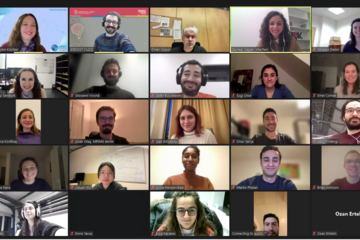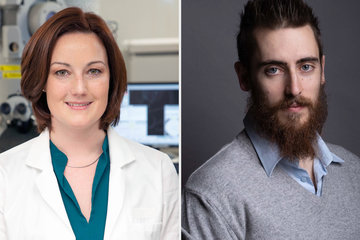New measures in support of young researchers
Max Planck President Stratmann underlines the importance of effectively supporting young researchers for own research organizations and the German science system
Attractive offers and a strong visibility are needed in order to win the best talents on a global level, said Max Planck President Martin Stratmann at the conclusion of the 68th annual meeting in the Erfurt Kaiser Hall. The new Max Planck Schools, which are being developed in cooperation with the University Rectors' Conference and other partners, are intended to make a central contribution in this. Georg Schütte, State Secretary at the Federal Ministry of Education, confirmed in his speech that the BMBF will provide relevant funding. The first graduate students should be able to apply in the spring of next year.

In view of ever growing competition for the brightest young minds, Max Planck President Martin Stratmann believes the focus should be on initiatives to improve the support for young researchers and scientists. "In 2015, we already invested 50 million euros annually to provide postgraduate and postdoctoral students with attractive contracts. In addition, we have new guidelines in place to safeguard high-quality supervision. We also want to ensure that students can obtain further qualifications in addition to their scientific work," Stratmann said in his speech. As only a small proportion of the almost 9,000 young scientists within the Max Planck Society permanently remain within research, course offers providing advice on alternative career paths are particularly relevant. "One thing to bear in mind is that while it is important to foster talents for science, it is equally true that science fosters talents - in all areas," Stratmann emphasized.
Since Germany has no research beacons with such great international appeal as Harvard, MIT, or Oxford, the German science system has disadvantages in attracting international top PhD students. This is exactly what the Max Planck Schools should help change. The schools are designed as transregional research and training networks that bring together outstanding scientists from all over Germany in innovative fields in the humanities, social sciences, natural sciences, and life sciences. "In these schools, we want to coalesce the excellence distributed throughout Germany, and also make it visible internationally," Stratmann explains. After all it is this very visibility that is so decisive in the competition for outstanding young researchers. Stratmann says he is particularly pleased that "we can successfully initiate this project together with leading German universities and other non-university research institutions". Three Max Planck schools are planned for a pilot phase of five years, the selection decisions are scheduled to take place in July. Stratmann underlined that the schools are an initiative from science for all science players, and that the emphasis was not on any specific institutions throughout the regions, but on the best minds from universities, the MPG and other non-university research institutions.
Panel discussion on career questions

Career conditions within research were also the topic of a panel discussion during the Plenary Assembly. Reinhard Jahn, Director at the Max Planck Institute for Biophysical Chemistry in Göttingen and Chairperson of the Presidential Committee on improving the support of junior scientists in the MPG, discussed the isse with Florian Meinel, research assistant at the legal Faculty at Humboldt University and former speaker of the Junge Akademie, as well as Henrike Müller-Werkmeister who is conducting research as a postdoc at a Max Planck Institute in Hamburg. The discussion was moderated by the freelance author and journalist Florian Felix Weyh.
The 68th annual meeting had kicked off the previous day with presentation of the Stifterverband Science Prize 2017 in the auditorium of Friedrich Schiller University in Jena. Peter H. Seeberger was honoured with the prize, which is endowed with 50,000 euros, for his pioneering work on the automated synthesis of sugars which enables new kinds of vaccines to be developed and has already led to several spin-offs.
For his pioneering work on the automated synthesis of sugars which enables new kinds of vaccines to be developed and has already led to several spin-offs, the chemist Peter H. Seeberger has been awarded with the Stifterverband Science Prize 2017. The prize-giving ceremony took place on Wednesday evening in the auditorium of Friedrich Schiller University in Jena. The prize was presented by Andreas Barner, President of the Stifterverband, and Max Planck President Martin Stratmann. The laudatory speech was delivered by Ferdi Schüth, Vice President of the Max Planck Society. Another highlight of the evening was a panel talk, where laureate Peter Seeberger provided further insights into his research. Afterwards, there was a reception on invitation of Minister President Bodo Ramelow in Jena's former public baths, which have been transformed into an event location. Around 600 participants had been expected to the annual gathering. High-ranking guests included Wolfgang Tiefensee, Minister of Economy and Science of the State of Thuringia, Georg Schütte, State Secretary at the Federal Ministry of Education, the President of the Friedrich-Schiller University, Walter Rosenthal, as well as several Nobel Prize winners of the Max Planck Society.
Joachim Gauck elected as Senator
As part of the annual meeting on Wednesday, outstanding young researchers were honoured for their pioneering work, including the 30 recipients of the Otto-Hahn-Medal. The annual gathering was also the occasion for meetings of the Max Planck Society's management bodies. Next to the Senate and Executive Committees, these are the Sections that discuss, amongst other things, the appointment of further Scientific Members. The General Assembly elected 10 new Senators, including former Federal President Joachim Gauck. The panel also adopted the 2016 Annual Report. As well as key facts and figures, this report also contains three accounts of research projects from the three Sections. Johannes Krause, Director at Jena's Max Planck Institute for the Science of Human History, writes on the revolution of genetic research and the resulting findings on human evolution, Volker Mailänder and Katharina Landfester take as their subject the potential of nanomaterials to facilitate the transport of active agents in medicine and Matthias Mann looks at proteomics in its shift from a technology of basic science to a universal diagnostic tool.
Presence at three locations in Thuringia
The Max Planck Society carries out research at three institutes in Thuringia, in Jena alone with a workforce of roughly 750. Scientists from the Max Planck Institute for Chemical Ecology the Max Planck Institute for Biogeochemistry as well as the Max Planck Institute for the Science of Human History are closely involved in the research structures of the region, in addition to enjoying strong international networks. Alongside honorary professors at the Friedrich Schiller University Jena, this also includes research projects such as the Jena Experiment, one of the world's largest and most long-term biodiversity experiments which was co-founded by researchers of the Max Planck Institute for Biogeochemistry, and in which today researchers from several universities and the German Centre for Integrative Biodiversity Research (iDiv) are also playing a leading role. The two International Max Planck Research Schools (IMPRS) for doctoral training operated by local Max Planck Institutes help to build further networks with the University of Jena. Besides the IMPRS run by the MPI for Biogeochemistry, this also includes the IMPRS operated by the MPI for Chemical Ecology, which is a partner of the Jena Graduate School for Microbial Communication (JSMC) which received an award as part of the excellence initiative.
About the Max Planck Society
At 84 Max Planck Institutes and research facilities scientists are conducting basic research in the natural sciences, life sciences and humanities. The Max Planck Society has produced 18 Nobel Prize winners from its ranks since its inception in 1948. The MPG is the international flagship of German research: as well as five Institutes abroad, it runs 16 Max Planck Centers with partners such as Princeton in the USA, Science Po in France, University College London / UK or the University of Tokyo in Japan. Funded in equal measure by the Federal and State Governments, the Max Planck Society enjoyed basic funding of around 1.69 billion euros in 2016.













